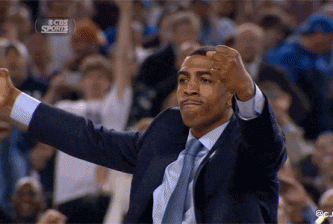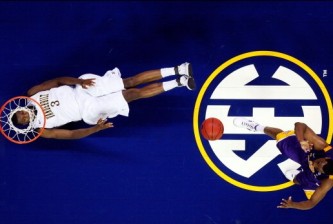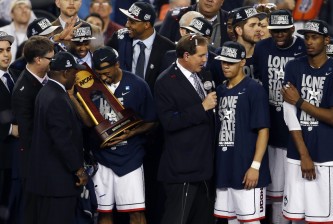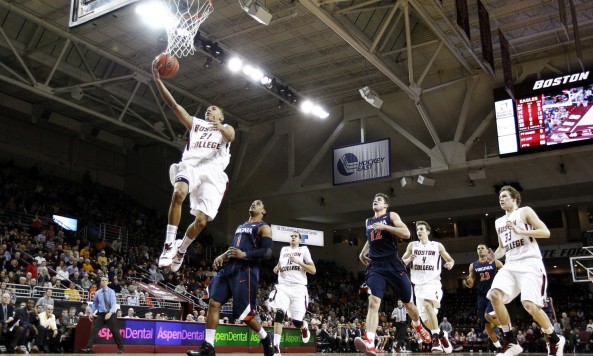The title for this preview comes from a butchered Albert Einstein quote, which is fitting, because it would take a brain the size of Einstein’s to properly evaluate the BC program. That’s not me, but I’ll do my best.
Typically, in year four you have a pretty good understanding of a new coaches ability. But we’re now entering year four of the Steve Donahue era, and the fanbase seems to be divided into any number of equally sized slices which range in opinion from “he’s a genius” to “meh.”
Year one of the Donahue era ended at 21-13 (9-7), but he had been left with a senior laden roster and a guy named Reggie Jackson. The fact that the year didn’t end in the NCAA Tournament is neither an indictment against Donahue, nor a mark in his favor. He took a fairly talented roster which he had no part in building, and had a fairly promising season.
It wasn’t until year two that his tenure really began. BC had a completely revamped roster which included a starting lineup and sixth man that were entirely freshmen with the exception of one junior transfer. And that team was awful. They went 9-22 (4-12). Their offense was abysmal, ranking 293rd in oEff, which was better than only three high major programs – and to be honest, two of those programs (Texas Tech and Utah) qualify as high majors in name only. The best thing you can say about the 2011-12 BC team is that they didn’t foul very much.
Then last season, featuring two more freshmen who led the team in minutes, BC improved to 16-17 (7-11), and had one-point losses to both Miami and Duke. Zero of the top seven players (in terms of minutes) were upperclassmen.
That’s progress, and progress is good, right?
One knock against Donahue is that he hasn’t exactly been tearing up the recruiting circuit. Yes, Olivier Hanlan made the All-ACC Freshman Team, but it’s not like high major programs were beating down Hanlan’s door. The same could be said for Joe Rahon who came out of San Diego. He turned out to be a fantastic freshman, but what are the chances that Donahue can consistently identify fringe high major prospects who are under-rated by virtually everyone? If he can, that’s great, but I find that hard to believe. Successful basketball teams are built around consensus top 100 recruits, and Donahue is yet to land one.
With a roster loaded with juniors, the 2015 class will be huge for the program’s future. To upgrade the talent on the roster, he needs to win with what he has now. Is BC ready to do that?
The good news is that the awful offense from 2011-12 improved from 293rd to 45th last year. Teams don’t make that kind of leap. It’s almost unprecedented. But they did it, and most importantly they did it with two true freshmen playing more minutes than anyone on the roster. Their offense is partially obscured by their slow tempo, but points per game is a meaningless stat, and from an efficiency standpoint they were really really good.
Now, all five starters return, and their offense could improve into the top 30 or so. It’s built around 6-8 junior Ryan Anderson who had some monster games last year. He had 29 points and 17 rebounds in the season opener vs FIU. He had 25 and 19 vs New Hampshire. And he had 18 and 11 in a solid late season win vs Clemson in the middle of a 4-game winning streak. He takes 49% of his shots at the rim, and drew more fouls/40 than all but three ACC players.
Rising 6-4 sophomore Olivier Hanlan became a household name after dropping 41 on Georgia Tech in the ACC tourney, but he had five other games where he scored at least 20. Also – among freshman who used at least 20% of their team’s possessions – he had the highest offensive rating in the conference.
The other three starters (6-2 sophomore Joe Rahon, 6-3 junior Lonnie Jackson, and 6-5 junior Patrick Heckmann) all had offensive efficiencies over 103. Offensive efficiency typically climbs throughout a player’s career, and BC had a very efficient offense despite being younger than all but seven Division I teams.
That’s the good news.
The bad news is the defense. In Donahue’s three years BC has been ranked 204th, 188th, and 174th in defensive efficiency. Just like their offense, the data here is obscured by a slow tempo. They don’t give up a ton of points per game – but on a possession by possession basis, they haven’t been good.
And historically, there isn’t much reason to believe that Donahue will coach a good defensive team. None of his teams have ever finished among the nation’s top 100 defenses, and half have finished worse than 200th.
So what does this all mean for this year?
BC’s offense – barring terrible injury luck – should continue to improve. Their defense, simply through roster continuity, should be slightly better. And the end result will be a team going from a 16-17 year, to one that should be around the NCAA tournament bubble. If they can convert some of those close losses from last year (8 losses were by 5 points or fewer) into wins, this is a team that could be dancing.























